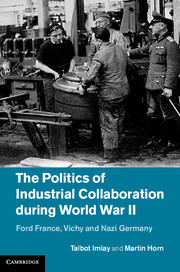The Politics of Industrial Collaboration during World War II Ford France, Vichy and Nazi Germany
Langue : Anglais
Auteurs : Horn Martin, Imlay Talbot

Important new study of wartime industrial collaboration focussing on Ford Motor Company's French affiliate during the Second World War.
Did Ford SAF sabotage the German war effort by deliberately manufacturing fewer vehicles than they could have? Ford SAF claimed after the war that they did. Exploring the nature and limits of industrial collaboration in occupied France, Horn and Imlay trace the wartime activities of Ford Motor Company's French affiliate. The company began making trucks and engine parts for the French military; but from 1940 until Liberation in 1944 was supplying the Wehrmacht. This book offers a fascinating account of how the company negotiated the conflicting demands of the French, German and American authorities to thrive during the war. It sheds important new light on broader issues such as the wartime relationship between private enterprise and state authority; Nazi Germany's economic policies and the nature of the German occupation of France, collaboration and resistance in Vichy France, and the role of American companies in Occupied Europe.
Preface; List of abbreviations; Introduction; 1. Ford SAF: 1929–40; 2. The initial struggle for control: 1940–1; 3. A year of transition: 1942; 4. A period of decision: the first half of 1943; 5. The extent and limits of industrial collaboration: 1943–4; 6. From liberation to disappearance: 1944–53; Conclusion; Appendices; Bibliography; Index.
Martin Horn is a member of the history department at McMaster University in Hamilton, Ontario, Canada where he teaches courses on modern European history, European international relations, and war during the period 1870–1945. He is the author of Britain, France and the Financing of the First World War (2002), as well as articles and reviews in various scholarly journals, including the International History Review, the Business History Review, and Contemporary European History. He has been the recipient of a grant from the Social Sciences and Humanities Research Council of Canada and is presently writing a book on the American bank of J. P. Morgan and Co. from 1929–41.
Talbot Imlay is a member of the history department at the Université Laval in Québec, Canada, where he teaches courses on modern European and international history. He is the author of Facing the Second World War: Strategy, Politics, and Economics in Britain and France, 1938–1940 (2003) and co-editor with Monica Duffy Toft of Fog of Peace and War Planning (2006). He has published articles in several scholarly journals, including the American Historical Review, Past and Present, the Journal of Modern History and French Historical Studies. He has received grants from the Social Sciences and Humanities Research Council of Canada, and in 2006–7 he was an Alexander von Humboldt Fellow at the Humboldt-Universtität in Berlin. He is currently writing a book entitled The Practice of Socialist Internationalism: British, French and German Socialists and International Politics, 1918–1960.
Talbot Imlay is a member of the history department at the Université Laval in Québec, Canada, where he teaches courses on modern European and international history. He is the author of Facing the Second World War: Strategy, Politics, and Economics in Britain and France, 1938–1940 (2003) and co-editor with Monica Duffy Toft of Fog of Peace and War Planning (2006). He has published articles in several scholarly journals, including the American Historical Review, Past and Present, the Journal of Modern History and French Historical Studies. He has received grants from the Social Sciences and Humanities Research Council of Canada, and in 2006–7 he was an Alexander von Humboldt Fellow at the Humboldt-Universtität in Berlin. He is currently writing a book entitled The Practice of Socialist Internationalism: British, French and German Socialists and International Politics, 1918–1960.
Date de parution : 04-2014
Ouvrage de 302 p.
14.7x23.1 cm
Thème de The Politics of Industrial Collaboration during World War II :
© 2024 LAVOISIER S.A.S.



